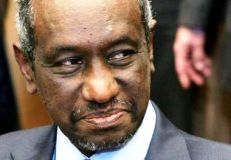Sudan’s Taha urges holdout rebels to join Darfur peace accord
May 16, 2006 (KHARTOUM) — Sudan’s Second Vice-President Ali Osman Taha exhorted two holdout Darfur rebel groups to sign a fragile peace agreement reached in Nigeria early this month.
 Only the largest faction of one of two main rebel groups signed the peace agreement with Khartoum at the African Union-sponsored talks in Abuja on May 5.
Only the largest faction of one of two main rebel groups signed the peace agreement with Khartoum at the African Union-sponsored talks in Abuja on May 5.
“I am calling on the two brothers Abdelwahid al-Nur and Khalil Ibrahim to make a courageous decision and join the peace process,” he said at a press conference.
Nur’s faction of the Sudan Liberation Movement (SLM) and Ibrahim’s Justice and Equality Movement have so far refused to endorse the agreement signed by SLM leader Minni Minawi.
On Monday, the African Union (AU) gave the two groups until May 31 to join the peace agreement or face sanctions but the rebels want more concessions from Khartoum.
Nur represents the largest tribe in Darfur and officials have warned the Abuja deal would fail to end the more than three-year-old bloodshed without his support.
Taha also reiterated his government’s calls on all Darfuris to disarm but did not elaborate on the measures taken to disarm the infamous Janjaweed, a pro-government militia accused of perpetrating genocide.
“We reiterate our call on all people carrying arms in Darfur to respect the ceasefire and cooperate with the government,” he said.
The Sudanese government had promised to start disarming the Janjaweed as of Monday, a process which is due to be completed by mid-October.
Taha, whose regime is under intense US and international pressure to accept a UN contingent to take over from AU peacekeepers, reiterated that such a deployment could only take place at Khartoum’s request.
“Whether the UN are coming or not, it will depend on the government of Sudan. He will be the one to invite them,” he said in English.
Some 7,000 AU peacekeepers are currently deployed over a territory roughly the size of France and have failed to quell the violence that erupted between ethnic minority rebels and government forces in February 2003.
The combined effect of the civil war and famine has left some 300,000 people dead and more than 2.4 million displaced, in what has been described by the United Nations as the world’s worst humanitarian crisis.
(ST)
